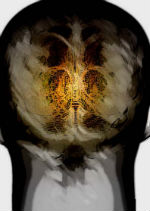What is Normal Pressure Hydrocephalus?
Normal pressure hydrocephalus (NPH) is the increase in intracranial pressure due to abnormal accumulation of cerebrospinal fluid (CSF) in the brain. This swelling of the brain affects the brain's ability to function normally. The buildup of fluid occurs when there is blockage in the flow of cerebrospinal fluid.
There are a number of suspected causes for NPH, including head trauma, brain tumor, subarachnoid hemorrhage, complications of surgery and infection. Congenital hydrocephalus may also be a cause for the onset of normal pressure hydrocephalus as an adult. Typically, NPH affects elderly patients over age 60, both men and women alike. At this time, it is not suspected the NPH is hereditary.
Patients with NPH may experience urinary incontinence, abnormal gait (walking) and mental decline. Because the symptoms of NPH are very similar to other neurological disorders, including Parkinson's and Alzheimer's, it is often misdiagnosed. Neurologic testing using CT or MRI scans, lumbar puncture and intracranial pressure monitoring is often used to help diagnose NPH.
Symptoms of Normal Pressure Hydrocephalus

Patients experiencing gait dysfunction may exhibit unsteadiness in walking as well as difficulty in taking a step. The legs are typically weakened and may cause patients to suddenly fall while walking.
Mental decline is typical in NPH patients and may include memory loss, difficulty with speaking and changes in mood or behavior. Because memory problems mimic symptoms of Alzheimer's disease, patients with normal pressure hydrocephalus are often misdiagnosed.
Urinary incontinence is the loss of bladder control and inability to hold the urine. Patients may also experience the frequent urge to urinate. Urinary incontinence usually presents later in the progression of NPH.
Diagnosis of Normal Pressure Hydrocephalus
Since the symptoms of NPH are similar to other neurological disorders, such as Alzheimer's and Parkinson's Disease, thorough testing is needed for an accurate diagnosis. Patients with suspected normal pressure hydrocephalus are encouraged to visit a neurologist familiar with this illness.
The initial visit with the neurologist will start with a walking evaluation to determine the severity of gait dysfunction. A CT scan or MRI of the head and brain will be ordered to see the enlarged ventricles with elevated levels of cerebrospinal fluid (CSF), and the swelling of the brain will be assessed. After diagnostic imaging is complete, the physician will typically perform a lumbar puncture (spinal tap) to measure the CSF levels. Intracranial pressure will also be carefully monitored for changes.
Treatment of Normal Pressure Hydrocephalus
- Short-term therapeutic interventions used for the treatment of NPH include:
- Botulinum toxin therapy for movement disorders
- Deep brain stimulation surgery (DBS)
- Intrathecal baclofen therapy (ITB)
- Medical management
A more permanent solution for NPH patients involves the surgical placement of a shunt in the brain to drain excess cerebrospinal fluid (CSF) into the abdomen, where it can be absorbed. This allows the brain ventricles to return to their normal size. Most patients experience a reduction in swelling within a few days after surgery, and an immediate improvement in their ability to walk and function. Regular follow-up care by a physician is important to identify subtle changes that might indicate problems with the shunt.
The highly skilled neurosurgeons and neurologists affiliated with the Mischer Neuroscience Institute, in collaboration with The University of Texas Health Science Center at Houston (UTHealth) Medical School, use the most advanced treatment options for patients with normal pressure hydrocephalus, based on innovative research.
Contact Us
Please fill out the fields below, and we will contact you.